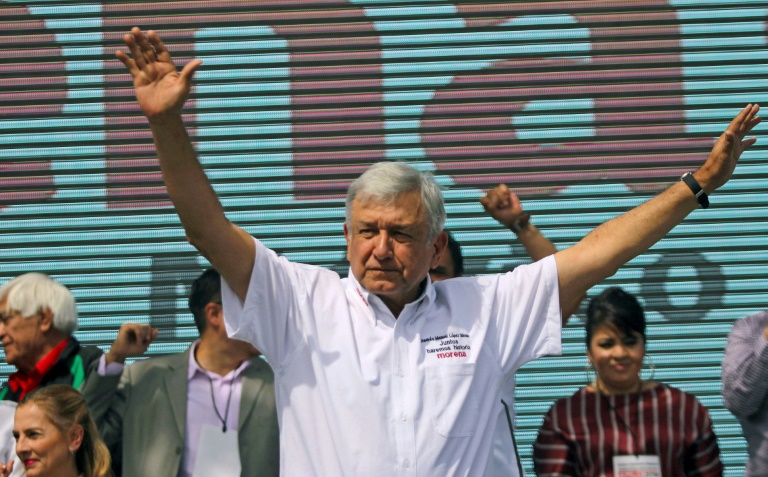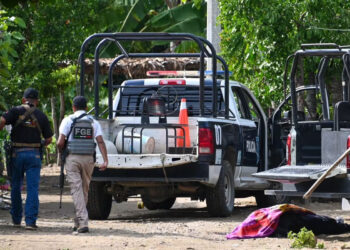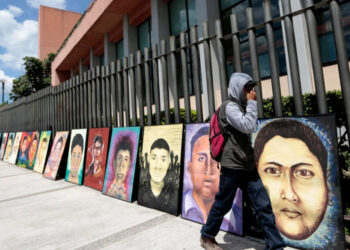On April 12, during Mexican President Andres Manuel Lopez Obrador’s daily morning press conference, journalist Jorge Ramos contradicted the president’s optimistic claim that violence had diminished since he took office. The anchorman of the Spanish-speaking channel Univision warned that if the pace of homicides would not slow down in the next few months, Obrador’s first year in power would result in a record year.
This public debate with the president unleashed national controversy regarding the new government’s effectiveness in dealing with the violence that has muddied the nation’s life for years. To get out of trouble, the president promised policies that would decrease violence in six months.
Lopez Obrador’s supporters argue that one cannot expect a structural problem that has developed over several decades to be solved in a few months. According to this view, the solution requires profound changes within the country’s economic, cultural, and judicial structures, and that takes time.
Corruption and Mexico’s Political Culture
Corruption is the primary structural issue that has made violence a prevalent factor in Mexico. The collusion of authorities with criminals has been extensively recorded since the 19th century but has reached outrageous levels in present times. This collusion is crucial to understanding why the levels of impunity have been consistently over 95 percent since the 1990s. Corruption has become a defining aspect of Mexico’s political culture, leading to far-reaching consequences.
For example, in the midst of a war between the Zeta and Jalisco Nueva Generación cartels, that has lasted ten years, 5,000 people have disappeared in the eastern state of Veracruz alone. The majority of the kidnappings of Zeta members were conducted by the state police under the command of the Jalisco cartel. The new governor, aligned to Lopez Obrador’s agenda, has to deal with an unreliable police department. Opponents do not believe that this system of corruption can easily be disarticulated. Human rights activists express worry as the levels of impunity and corruption have not yet changed.
In response, the president’s supporters point to the drastic reduction of fuel robbery that had drained pipes for decades (from 80,000 stolen barrels per day in January to 4,000 today) as proof of the new government taking the task of fighting corruption seriously.
Why, then, has violence increased in the first three months of Lopez Obrador’s presidency? What changes in public policies, violence prevention, and the rule of law has this new government promoted and implemented and how can their effectiveness be assessed?
Violence and Organized Crime
These questions cannot be answered in a few lines; however, some clues can lead to an analysis of the present political juncture. For a start, it is not true that violence increased because Lopez Obrador became president. Except for the almost disarticulated system of fuel robbery (primarily because it relates to specific actors like union leaders and corrupt politicians), violence related to organized crime continues an upward tendency that began before Obrador took office.

Should this tendency continue, homicides in 2019 would surpass 2018 (23.1 homicides per 100,000 people), just as 2018 was worse than 2017 (20.27 homicides per 100,000 people). These homicides are the result of the wars between the cartels, whose power has increased due to greater territorial control and diversification in businesses. Besides drug trafficking, cartels now extort the population, kidnap, and are involved in slavery.
Large areas of Mexico are under the control of different criminal organizations, which have been engaged in several wars for over a decade. As they increase territorial control, monetary accumulation and hence the number of weapons and their capacity for corruption and blackmailing of authorities grows.
Lopez Obrador’s Inheritance
Lopez Obrador inherited a country undergoing a civil war disguised as multiple confrontations between criminal groups. Since the 1990s, criminal organizations have been incorporating significant areas of the state into their structures. Several police corporations, judges, majors, and even governors protect criminal activities instead of fighting them, which makes any effort to eradicate corruption a complex conundrum.
Violence has not been eliminated because of this pervasive corruption. But even so, the government has not yet offered a realistic solution to the problem.
Mexico’s Fourth Transformation
The fight against corruption was the main flag Lopez Obrador hoisted during his political campaign to become president. He promised that by reducing corruption, violence would be eradicated.
This reduction would require such a profound transformation of political structures that it is compared to the War of Independence (1810-1821), the Liberal Reform (1850-1860s), and the Mexican Revolution (1910). In this sense, Lopez Obrador’s time in office would result in a “fourth transformation of public life.” The outcome of the fight against corruption and violence will be the key criteria to gauge his regime’s effectiveness.
AMLO promises a “fourth transformation” of Mexico https://t.co/MtSd51DND4
— The Economist (@TheEconomist) September 24, 2018
Still, the main question to address is the success of Lopez Obrador’s policies against violence. His stellar strategy for fighting insecurity is the creation of the National Guard, which would concentrate the functions of the Federal Police and the Migration Police with strong military participation. This concentration of power has not been well received by several fronts, from academia to NGOs and international organizations like the United Nations. The reason: the participation of military personnel will keep the National Guard acting in ways different from what human rights advocates would like to see.
This reluctance to support military participation stems from the justified fear of the army’s abuse of the population, as grave human rights violations by militaries have occurred since 2007, during the so-called “war on drugs” supported by the United States.
Security and Social Peace
Since former President Felipe Calderon began his military strategy against cartels in his first months in office in 2007, thousands of disappearances and other abuses like torture, crime fabrication, and murders against civilians have been reported with very few cases of military corruption and extrajudicial violence brought to justice.
To recover confidence in the military, Mexicans need to see change. In response to the points raised by civil organizations and the academia, the government is training military personnel and those recently recruited for the National Guard in human rights issues. The nation has, at least for the moment, given this move the benefit of the doubt.
Two more strategies are part of Lopez Obrador’s plan for security and social peace: the support of youth in education and employment, and social investment in areas where, like in some rural regions, people have been forced to work for the cartels.
These long-term plans remain suspended between doubt and suspicion of it being simply an electoral agenda. It’s too early to see whether those changes in public policies will have any positive effects in arresting the progress of a war that has lasted more than a decade, and yet, too few still dare to call it a war.
Disclaimer: The views and opinions expressed here are those of the author and do not necessarily reflect the editorial position of The Globe Post.





















